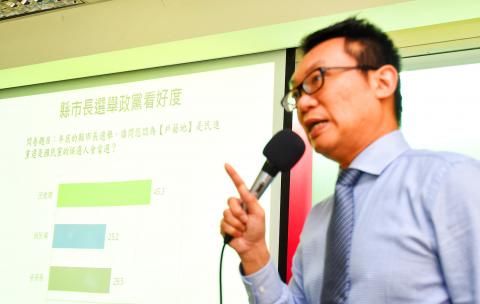More than 40 percent of the public believes that the Democratic Progressive Party’s (DPP) candidates will win in November’s mayoral and county commissioner elections, a poll published yesterday by the Taiwan NextGen Foundation showed.
According to the survey, 45.3 percent believe that the DPP’s candidates will win in the Nov. 24 nine-in-one elections, while 49.1 percent think that the party will win the majority of seats across the nation.
The poll showed that overall, 65.1 percent of respondents are satisfied with the administrative performance of the mayor or commissioner in their city or county of residence, while 24.8 percent are dissatisfied.

Photo: Liu Hsin-de, Taipei Times
The highest average satisfaction rate of 67.1 percent was in cities or counties that have a DPP member as an administrative head, followed by 63 percent in areas with a Chinese Nationalist Party (KMT) head and 60.4 percent in areas with an independent head.
Asked about their voting preference, about 35.9 percent said they would consider voting for the DPP’s candidate, while 27.6 percent said they would consider the KMT’s candidate first.
However, 25.2 percent said they believe the KMT’s candidate will win.
A cross-analysis of the data showed that more than 41 percent intended to support the party that the mayor or commissioner of their city or county of residence is a member of.
In areas with independent administrative heads — Taipei and Hualien and Kinmen counties, the party support rates showed a fairly even distribution among the DPP (24.6 percent), the KMT (25.7 percent) and independents (24.5 percent).
The survey found that 33.6 percent would prefer voting for the DPP’s candidate, 28.5 percent for the KMT’s candidate and 4.9 percent would prefer independent candidates.
Former DPP spokeswoman Wu Pei-yi (吳沛憶), who is to run in the party’s primary for a city councilor seat in Taipei’s Zhongzheng (中正) and Wanhua (萬華) districts, said it seems that most people will vote for DPP or KMT candidates.
However, about 8.4 percent of respondents said they would support third-party or independent candidates in the councilor elections and this combined force might have a big influence on the councilors’ votes, she said, adding that many of the candidates are aged between 25 and 35 and have entered politics through the Sunflower movement.
Foundation chairman Wang Zhin-sheng (王智盛) said that nearly 30 percent of pan-green camp supporters were unwilling to name their preferred party in the election, which might indicate that they are waiting to see the DPP’s nominee for the Taipei mayoral election.

The US government has signed defense cooperation agreements with Japan and the Philippines to boost the deterrence capabilities of countries in the first island chain, a report by the National Security Bureau (NSB) showed. The main countries on the first island chain include the two nations and Taiwan. The bureau is to present the report at a meeting of the legislature’s Foreign Affairs and National Defense Committee tomorrow. The US military has deployed Typhon missile systems to Japan’s Yamaguchi Prefecture and Zambales province in the Philippines during their joint military exercises. It has also installed NMESIS anti-ship systems in Japan’s Okinawa

‘WIN-WIN’: The Philippines, and central and eastern European countries are important potential drone cooperation partners, Minister of Foreign Affairs Lin Chia-lung said Minister of Foreign Affairs Lin Chia-lung (林佳龍) in an interview published yesterday confirmed that there are joint ventures between Taiwan and Poland in the drone industry. Lin made the remark in an exclusive interview with the Chinese-language Liberty Times (the Taipei Times’ sister paper). The government-backed Taiwan Excellence Drone International Business Opportunities Alliance and the Polish Chamber of Unmanned Systems on Wednesday last week signed a memorandum of understanding in Poland to develop a “non-China” supply chain for drones and work together on key technologies. Asked if Taiwan prioritized Poland among central and eastern European countries in drone collaboration, Lin

BACK TO WORK? Prosecutors said they are considering filing an appeal, while the Hsinchu City Government said it has applied for Ann Kao’s reinstatement as mayor The High Court yesterday found suspended Hsinchu mayor Ann Kao (高虹安) not guilty of embezzling assistant fees, reducing her sentence to six months in prison commutable to a fine from seven years and four months. The verdict acquitted Kao of the corruption charge, but found her guilty of causing a public official to commit document forgery. The High Prosecutors’ Office said it is reviewing the ruling and considering whether to file an appeal. The Taipei District Court in July last year sentenced Kao to seven years and four months in prison, along with a four-year deprivation of civil rights, for contravening the Anti-Corruption

NO CONFIDENCE MOTION? The premier said that being toppled by the legislature for defending the Constitution would be a democratic badge of honor for him Premier Cho Jung-tai (卓榮泰) yesterday announced that the Cabinet would not countersign the amendments to the local revenue-sharing law passed by the Legislative Yuan last month. Cho said the decision not to countersign the amendments to the Act Governing the Allocation of Government Revenues and Expenditures (財政收支劃分法) was made in accordance with the Constitution. “The decision aims to safeguard our Constitution,” he said. The Constitution stipulates the president shall, in accordance with law, promulgate laws and issue mandates with the countersignature of the head of the Executive Yuan, or with the countersignatures of both the head of the Executive Yuan and ministers or